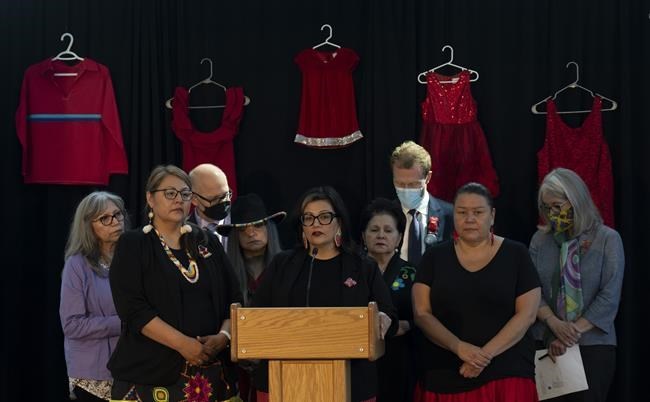Advocates across the country had a similar message for Ottawa one year after it released a national plan to end violence against Indigenous women and girls: the federal government has failed to live up to its commitments.
"It is with deep disappointment and frustration that I say that the lack of accountability in the past year is staggering and unacceptable," Hilda Anderson-Pyrz, chairwoman of the National Family and Survivors Circle, said Friday.
"This is a national shame and is also dangerous. Each day of inaction in this area leads directly to the tragic loss of human life and further violence."
Anderson-Pyrz spoke at an event in Gatineau, Que., marking the plan's first year and the third anniversary of a final report from the National Inquiry into Missing and Murdered Indigenous Women and Girls that outlined 231 calls to justice. Crown-Indigenous Relations Minister Marc Miller, Indigenous Services Minister Patty Hajdu and Justice Minister David Lametti also attended.
The National Family and Survivors Circle had been hopeful that the plan and a "federal pathway" document last year were a new way forward to put families at the centre of efforts to end systemic barriers and discrimination.
Anderson-Pyrz says that has not been the case.
"Impacted family members and survivors are not mere symbols of this crisis. We have a wealth of lived experience, expertise and knowledge that should be centred in all actions toward ending gender- and race-based violence."
"Without the political will to create transformative change, this genocide will continue."
Anderson-Pyrz referred to five Indigenous women who have been found dead this year.
Tytiana Janvier from northern Alberta died in March of what police said was a drug overdose.
Chelsea Poorman's remains were found in a Vancouver home in April. She had been missing from her Saskatchewan First Nation since 2020.
Rebecca Contois, Doris Trout, and Anderson-Pyrz's own niece, Tessa Perry, were found dead in Winnipeg in the last month. Police have declared the women victims of homicide.
At least 89 Indigenous women and girls have been killed since the release of the inquiry's final report, shows data from the Canadian Femicide Observatory for Justice and Accountability.
It said the number is an underestimation since it does not include suspicious deaths, women who have disappeared and some probable cases in which Indigenous victims were not identified.
Ottawa released its own progress report Friday about work completed between April 1, 2021, and March 31, 2022, in several priority areas the inquiry outlined.
"Things aren't moving fast enough but they are moving forward," Miller said.
The anniversary was not a day for people to pat themselves on the back, he added, as Indigenous women and girls still do not have the basic right of safety and security in their communities.
The progress report said more than 25 departments and agencies are activating the plan through programs, funding and new or renewed policies.
New programs include support for families and survivors, cultural spaces, health and wellness, and languages, the report said.
Creation of an oversight body to represent the interests of families, survivors and Indigenous communities has not happened. Miller said there is no excuse for that and the government is working on it.
The Native Women's Association of Canada released its own analysis that said there have been funding commitments, but little has been done to directly support survivors and families.
"We're hearing that it's just simply not translating into the help that's required on the ground," said CEO Lynne Groulx.
"We're three years in. That's very discouraging for family members who need to see some action."
A group representing Métis women announced it was stepping away from the federal progress report.
The organization said in a statement Friday the report was rushed and does not fully describe the lack of tangible action.
“We support the voices of national and provincial Indigenous women’s organizations” said president Melanie Omeniho. “Our voices have been silenced in what can only be described as political pretence.”
Prime Minister Justin Trudeau reaffirmed his government's commitment to work with survivors, families, communities and other partners.
"We will not forget those who never came home and we will honour their memories by working tirelessly to build a better future, where everyone is safe from violence," he said in a statement.
This report by The Canadian Press was first published June 3, 2022.
Brittany Hobson, The Canadian Press




